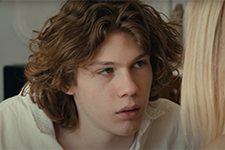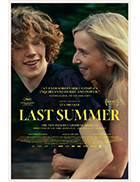Last Summer (L’été dernier)
|  Last Summer (L’été dernier), provocative French director Catherine Breillat’s first film in a decade, is a remake of the 2019 Danish film Queen of Hearts (Dronningen). Breillat’s version tracks fairly closely with the original film, written by Maren Louise Käehne and director May el-Toukhy, in telling the story of a successful, middle-aged attorney who has an ill-advised affair with her teenage stepson. The exact reasons for the affair are vague, which is part of the film’s problem. Watching otherwise successful, intelligent people give in to base instincts that are sure to doom them (or those around them … or both) can be an exercise in frustration, especially when the reasoning for their actions makes little sense. We first see the attorney, Anne (Léa Drucker), interviewing a teenage victim of sexual assault, and the blunt nature of her questions to the girl informs us of the harsh reality in which she lives and works, but also her understanding of victimization—both the sexual victimization of rape victims, but also the way victims are often twisted into villains by defense attorneys. The film’s own brutal irony is that Anne will end up deploying this very tactic to protect herself, which turns her into the worst kind of hypocrite-villain. Like many of Breillat’s previous films, Last Summer, despite its idyllic-nostalgic title and air of provincial natural beauty, is a cynical take on human relationships in general and sexual relations in particular (a recent retrospective of her career at the Lincoln Center was titled “Carnal Knowledge”). Anne lives in a country home in the South of France with her husband, Pierre (Olivier Rabourdin), who has a high-stress, off-screen business career, and their adopted four-year-old twin daughters, Serena and Angela (Serena Hu and Angela Chen). Théo (Samuel Kircher), Pierre’s estranged teenage son from a previous marriage, comes to live with them because he has been kicked out of yet another school, and at first he appears to be little more than a sullen, myopic adolescent punk, obsessed with his phone and his own petty, privileged bitterness. Yet, as Kircher plays him, he is also charming and friendly, and he gets along great with Serena and Angela, which makes him stand out in a way that Pierre, the loving but often absent workaholic husband, does not. Théo is attractive and seductive in a coy, almost androgynous kind of way; his floppy hair, lanky body, and pouty lips made me think of Björn Andrésen, the object of desire in Luchino Visconti’s overrated Death in Venice (1971). It isn’t too hard to see why Anne would be drawn to him even though Breillat, who co-wrote the screenplay with Pascal Bonitzer, doesn’t suggest that Anne is unhappy in her marriage to Pierre. In fact, there are several scenes early in the film that suggest a tenderness and affection between them, although later scenes might cause you to question whether they were genuine or simply practical affectations Lea needed to employ in the moment. Just because she doesn’t reveal monstrousness until the end doesn’t mean it wasn’t always there. As she did in Fat Girl (À ma soeur!, 2001), Breillat uses Anne and Théo to represent two contradictory approaches to sexuality. For Anne, her affair with Théo must be contained and restrained, and after every tryst she informs him that they must stop. She is practical and self-absorbed and self-aware, which extends to her interactions with others. One of her worst fights with Pierre is in regard to her disdain for his dull work friends, which is what partially what compels her into Théo’s arms. Théo, on the other hand, has a romanticized idea about their interactions, and his youthful exuberance is the thing that constantly puts them at risk of getting caught. He can by cynical about sex, too, as is demonstrated when he brings home a girl one night just to stick it to his parents, but with Anne he becomes like an eager puppy, full of joy and longing that is destined to be crushed by Anne’s practical need to maintain the illusions of her life and marriage. As the film moves into its harsh third act, we begin to see Anne not as a decent woman who has allowed herself to be drawn into an ill-advised affair (a plotline that has held up too many a European drama about infidelity), but rather as vicious warden of her own privilege who turns Théo and Pierre against each other while playing the victim (“How dare you …!”). It is sickening to watch—Léa Drucker’s performance is genuinely powerful in this regard—and the problem with Last Summer is that Breillat does not take any kind of moral stance (in interviews she has insisted that she wants her characters to be viewed without judgment, but for anyone who believes that art and morality are intertwined, such statements are utterly vacuous). In a way, it seems like Breillat is seduced by Anne’s power to manipulate those around her and turn reality on its head, shamelessly lying and maintaining it with such intensity and unwavering authority that it becomes the reality under which everyone else must live. That is the very portrait of inhumanity and cruelty, especially toward Pierre, who, for all that we see, is a decent, albeit imperfect, husband and father. That, of course, may very well be the point Breillat is trying to make, and if so it is a deeply troubling and cynical perspective that she wields with a dramatic and visual authority that matches Anne’s base need to protect herself at all costs. Copyright © 2025 James Kendrick Thoughts? E-mail James Kendrick All images copyright © Janus Films |
Overall Rating: 

 (2.5)
(2.5)


